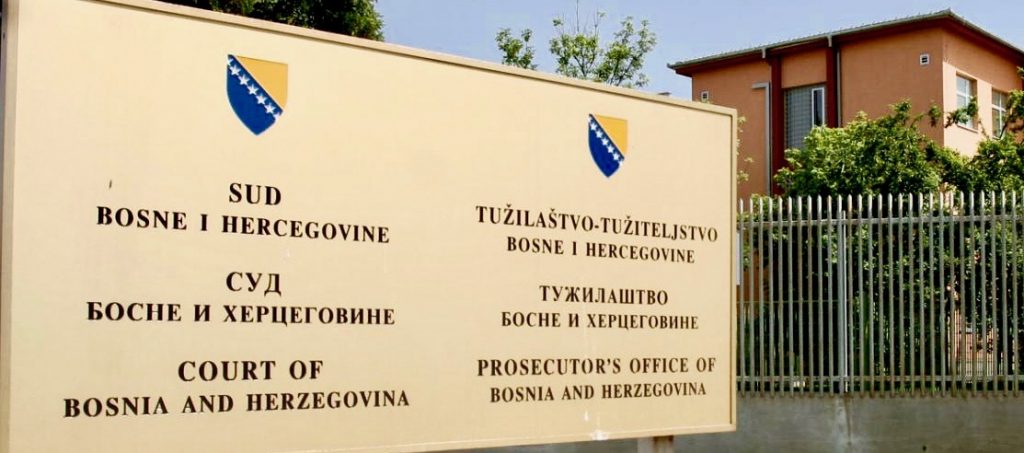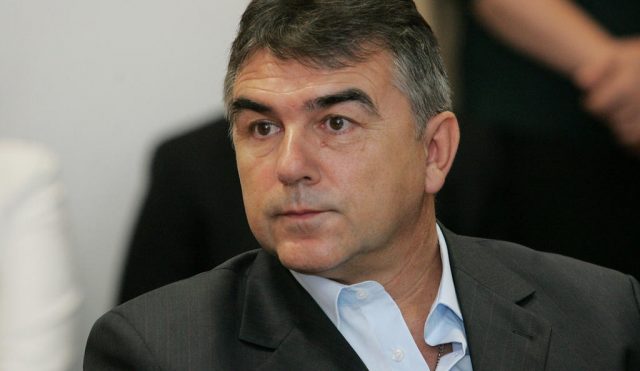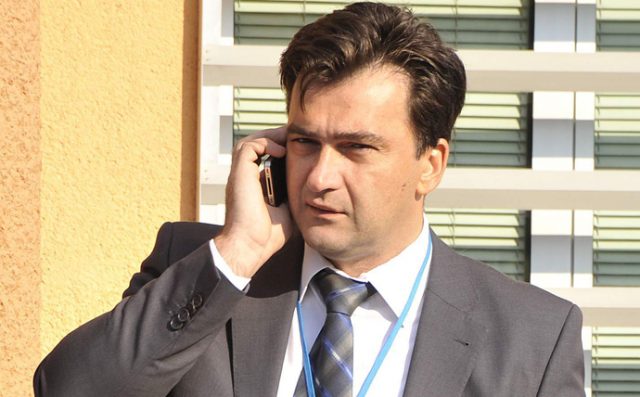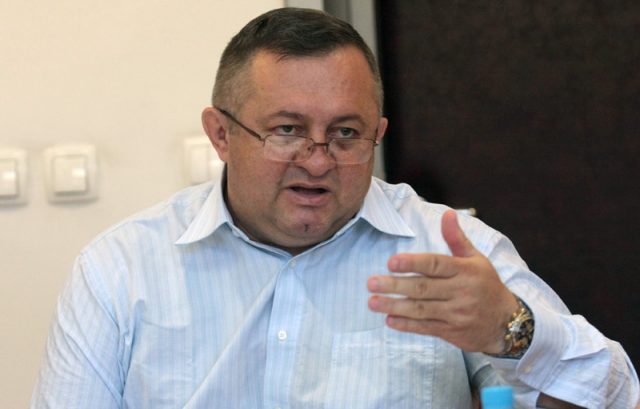
The Office of the Disciplinary Prosecutor (ODP) for the High Judicial and Prosecutorial Council (HJPC) of Bosnia and Herzegovina currently has 12 ongoing disciplinary proceedings against prosecutors and judges from state judicial institutions. Every year, the number of proceedings against prosecutors from the Prosecutor’s Office of BiH increases.
The Office of the Disciplinary Prosecutor (ODP) for the High Judicial and Prosecutorial Council (HJPC) of Bosnia and Herzegovina currently has 12 ongoing disciplinary proceedings against prosecutors and judges from state judicial institutions. Every year, the number of proceedings against prosecutors from the Prosecutor’s Office of BiH increases.
President of the HJPC, Milan Telgetija, considers the increase a positive development, however, the holders of judicial office would argue to the contrary. They consider the large number of disciplinary proceedings a source of embarrassment rather than something to brag about.
Among those who share such sentiments is Branko Peric, a judge at the Court of Bosnia and Herzegovina (BiH), who is himself the subject of an investigation by the HJPC’s Office of the Disciplinary Prosecutor.
“How is it possible that disciplinary proceedings are being launched on the basis media reports, instead of beforehand as a reaction to problematic behavior? This is simply inconceivable,” said Judge Peric.
In 2016, 28 legal disciplinary proceedings were finalized, nine of which had been initiated in 2015. A total of 32 disciplinary proceedings were initiated in 2016, which is almost twice as many as were initiated in 2014.
One of the more recent proceedings being led by the HJPC is the case against the suspended chief prosecutor of the Prosecutor’s Office of BiH, Goran Salihovic, who has been accused of obstructing investigations into certain high-ranking political officials, including the president of the Republika Srpska (RS), Milorad Dodik.

While the ODP has requested that Salihovic be relieved of his duties, his defense is convinced that the charges against him will be dismissed.
Charges Filed, Charges Dropped
In reference to the lawsuit against Salihovic, his lawyer Rifat Konjic has said that some of the charges are unfounded and that Salihovic’s actions were in accordance with the law. According to Konjic, the chief prosecutor also delivered the three pieces of information that directly addressed the lawsuit within 24 hours, as requested.
Konjic has also said that no office of disciplinary prosecution, whether it’s in BiH or in Zanzibar, has the authority to determine which prosecution will lead the “proceedings” against a state prosecutor and the same goes for the president of the Court, clearly indicating that BiH’s judicial system is highly dysfunctional.
“My conclusion is that the public has been excluded from these proceeding to hide from them the actual charges that are being brought against the chief prosecutor. In my opinion, his actions have not warranted any kind of proceedings before this commission,” Konjic stated.
The case against Salihovic was initiated as a result of a disciplinary complaint stating that he failed to recuse himself from cases where there was a clear conflict of interest, engaged in inappropriate contact with judges or parties involved with the cases, enabled people to perform prosecutorial duties that were not legally authorized to do so, and interfered in the activities of judges and prosecutors.
In addition to the disciplinary proceedings, a criminal investigation against Salihovic was launched by the Prosecutor’s Office of BiH. The first disciplinary hearing was postponed due to Salihovic’s request for the recusal of Mahmut Svraka, who was presiding over the Commission.
Disciplinary proceedings were initiated against Miroslav Janjic, a prosecutor at the Prosecutor’s Office of BiH, after he excluded “five dead heads” from a war crimes indictment, but these charges ended in a dismissal. This is yet another case of public interest for which the Disciplinary Appellate Commission upheld the decision to drop charges of negligence against Janjic related to his work on a case involving war crimes committed in the Bijeljina area.
Janjic was cleared of any charge of negligent action related to the case against Gligor Begovic, who was sentenced to ten years in prison for crimes committed in 1992 against civilians in the Batkovic detention camp near Bijeljina.

The ODP brought charges against Janjic for his failure to include the five people’s deaths as part of the indictment against Begovic even though there was sufficient evidence to do so, as well as for failing to present evidence for the death of two additional people after the indictment was confirmed.
Acting chief prosecutor, Gordana Tadic, is also facing disciplinary charges. Even a disciplinary report was filed by Prosecutor Janjic himself for, as he puts it, “negligence and carelessness in the performance of her duties”.
“In order to inform the public about the level of negligence related to war crimes cases, which is evidenced by the acting chief prosecutor’s near absence of interest in working on these cases during her time as head of the War Crimes Division, I filed a disciplinary complaint against Gordana Tadic for neglecting to perform her duties,” said Janjic.
Janjic claims that Tadic violated the Rules of Procedure of the Prosecutor’s Office of BiH, i.e. she failed to properly organize and oversee the work of prosecutors assigned to war crimes cases and failed to fulfill her obligation to review war crimes indictments.
Shortly after filing the complaint against Tadic, Janjic withdrew it without explaining why he had done so.

In another case, the HJPC’s Disciplinary Commission recently penalized Prosecutor Nives Kanevcev with a 20% salary reduction for a period of one year. The proceedings against the plaintiff were closed to the public in order to protect the personal data of those whose names were listed in the case documents. Over the course of the proceedings, it was proven that as head prosecutor of the Cantonal Prosecutor’s Office in Sarajevo, Kanevcev had overstepped her authority and undermined the prosecution’s independence when, in 2013, she provided a cross-section of the state of affairs for 16 cases pertaining to the ”Bosnalijek” company to the then federal prime minister, Nermin Niksic.
The ODP previously punished State Prosecutor Dubravko Campara by reducing his salary by 30% for a period of three months. He was the subject of disciplinary proceedings because of his contact with witness Azra Saric during the case against the leader of the Union for a Better Future Party (SBB), Fahrudin Radoncic, and others, which is still pending before the Court of BiH.
On two occasions, the ODP called for the temporary suspension of prosecutor Oleg Cavka of the Prosecutor’s Office of BiH. Shortly after the State Investigation and Protection Agency (SIPA) entered his office and private residences, these requests were denied.
Cavka was suspected of pocketing material evidence from an organized crime case. Media reports state that he allegedly used the confiscated cell phone of convicted felon, Anes Kurbegovic, for private purposes. This is not the first time Cavka has been under investigation – a few years ago he hacked into the e-mail account of the then chief prosecutor of the Prosecutor’s Office of BiH, Milorad Barasin, who has since been removed from office. Cavka was punished with a six-month salary reduction as a result.

It should be noted that the ODP has recently, ex officio, registered a case against deputy prosecutor of the Prosecutor’s Office of BiH, Bozo Mihajlovic, after the media reported the disappearance of a yellow envelope from the Milakovic case – the envelope allegedly contained around 55,000 BAM. This is also being investigated by the Prosecutor’s Office and it is not known when a prosecutorial decision will be made.
Judicial Scandals
One case the public is well aware of is that of Prosecutor Milorad Barasin.
Several years ago, recordings of his conversations during a private, ex parte meeting with international arms trafficker Slobodan Tesic were released.
Almost a year after the alleged investigation into Barasin’s “inappropriate contact” with the international arms trafficker began, one of the biggest judicial scandals in BiH ended in an even worse scandal. The HJPC issued an official announcement that the representatives of the Disciplinary Commission and Prosecutor Barasin had come to a mutual agreement that established disciplinary responsibility stipulating that, as his sentence, Milorad Barasin be a dismissed from his position as chief state prosecutor of the Prosecutor’s Office of BiH and moved to the position of prosecutor in the Special Department for War Crimes. He was to also incur a 10% salary reduction for a period of three months.

In an earlier period, Munib Halilovic, Vesna Ilic, Mirko Lecic, and their long-time boss Vesna Budimir, who has since resigned from the Prosecutor’s Office of BiH, have faced disciplinary measures for their many years of neglect of war crimes cases.
Goran Nezirovic, a member of the HJPC body that elects and appoints judges and prosecutors, believes that in the cases of judges and prosecutors there are often clear indications of violations of ethical standards, but the judiciary simply does not respond in a timely manner and does not recognize, or refuses to recognize, such behavior.
Nezirovic feels that the reasons for this include “conformity, not wanting to step on any toes, and false collegiality and solidarity”.
“The mentality has to change, but that kind of change takes time,” Nezirovic says.
When it comes to proceedings against judges and prosecutors from state judicial institutions, the public is also familiar with the case of Vlado Adamovic, who was charged with sexually harassing a florist. According to the indictment, Adamovic kissed the florist after she had told him she did not want to have any close contact with him.
Adamovic was dismissed from his position as a judge of the Court of BiH in June 2008 after the HJPC Appellate Commission concluded that he had undermined the reputation of the court with his immoral behavior towards the employee of the Sarajevo flower shop, who was a minor at the time. Adamovic now works as a lawyer.






